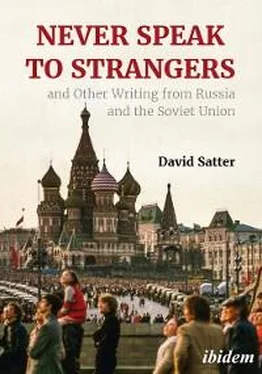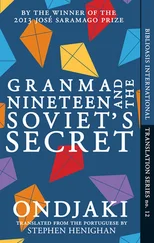The prospective espionage trial of Mr. Shcharansky and the trials of the other imprisoned Helsinki Group members will probably not begin until well after the Belgrade preparatory meeting is over, but the prospect of these trials is one measure of Soviet resistance to being pressed on the human rights issue.
The USSR has every reason to seek to avoid discussion at Belgrade of their implementation of the human rights provisions of the Helsinki Agreement. They have not honoured their human rights pledges and in the Belgrade review of Helsinki they face Western attempts to force them to accept some degree of internal liberalization in exchange for mutual security arrangements and closer ties.
The USSR was the driving force behind the idea of a European Security Conference ever since the Warsaw Pact first suggested it in the mid-1960s. The human rights provisions of the Helsinki Agreement’s Final Act, however, were accepted only reluctantly and growing Soviet apprehension over the possibility of being humiliated at Belgrade over the human rights issue has been reflected in a highly defensive propaganda campaign in the Soviet Press.
Soviet propaganda does not appear to have deterred the West from pressing the human rights question and the West’s determination to examine the issue thoroughly at Belgrade puts the Soviet Union in a quandary. The Soviet media have supported the Helsinki Agreement vociferously and were it not for the human rights provisions, the USSR could make a strong case that it has implemented the accords responsibly.
The USSR has incorporated the Helsinki statement of principles on international relations almost verbatim into the chapter of the new Soviet constitution on foreign policy and the 1975 friendship treaty signed by the Soviet Union and East Germany also enumerated the principles in the Helsinki Final Act.
The USSR has notified neighbouring countries about two sets of military manoeuvres in the last two years involving more than 25,000 men—one in the Caucasus and one in the area north of Leningrad—as called for in the Final Act, and Soviet disarmament proposals, such as the proposal for a treaty renouncing first use of nuclear weapons, are in keeping with the Helsinki call for steps toward effective disarmament.
The Soviet Communist Party leader Mr. Brezhnev has suggested international conferences on the environment, transport and energy in compliance with sections of the Final Act calling for international co-operation in these areas, and the Soviet Union has expanded its trade and industrial co-operation with the West and begun supplying trade statistics in keeping with the provisions of the Final Act on the exchange of commercial and economic information. It has also simplified procedures for foreign journalists and taken other steps to implement the agreement.
However, the Soviet Union has not honoured its Helsinki pledges to respect human rights and facilitate the free flow of information and it is this failure which is likely to be taken up at Belgrade because it undermines the Helsinki understanding on which better East-West relations were to be based.
The most striking example of the Soviet Union’s failure here has been the arrests of the members of the dissident groups who sought to monitor fulfilment of the Helsinki pledges. Between February and April, 10 members of the main Helsinki group in Moscow and affiliated groups in Georgia and the Ukraine were arrested (one was subsequently released), others emigrated under pressure and there were numerous house searches and confiscations directed against persons connected with the groups. Those few group members who remain active are under constant threat of arrest.
Against the general lack of democratic liberties, specific examples of the Soviet Union’s direct violation of its Helsinki human rights pledges include the widespread refusal of applications for family reunification (there are 50 outstanding cases involving Britain alone), the denial of the right to emigrate to more than 1,000 Penteconstalists and Baptists, the denial of national rights to the Crimean Tatars who have sought for many years to return to their homeland in the Crimea from which they were deported en masse in 1944, the denial of permission to emigrate to Germans and Jews for arbitrary reasons or with no reason given at all, and retaliation against those who seek to emigrate through dismissals, psychiatric confinement and arrests or trumped up charges.
Other violations of the Soviet pledge to facilitate the free flow of information include the switching-off of telephones for dissidents or those with contacts abroad, massive eavesdropping, mail and telegraph censorship, the effective embargo on non-communist foreign newspapers and periodicals, and the harassment of foreign journalists.
Soviet officials, in an implicit recognition that the Soviet Union has done little to improve its human rights record in the last two years, say implementation of the Helsinki human rights provisions depends on the level of détente. This may mean that the Soviet Union will not accept any Western attempt to make the level and quality of détente dependent on Soviet human rights observation.
At its final meeting before the Belgrade conference, the dissident committee to monitor the Helsinki accords made its own recommendations to the Belgrade conference. It suggested that objective criteria be established for assessing the Soviet Union’s human rights performance, which would bring the Western attempt to compel Soviet liberalisation into sharper focus. If the participants at Belgrade try to arrive at an East-West consensus on what it means to respect human rights, however, the result may not merely clarify the situation—it could also clarify how far apart the two sides really are.
Financial Times, Tuesday, September 20, 1977
Holidays in Russia
The Soviet masses are once again trickling away from the summer resorts, back to school and factory. The biggest exodus will come from Sochi, the country’s principal health resort and unofficial capital of the “Russian Riviera,” where at the height of the season holiday makers were arriving at a rate of over 50 trainloads and 100 flights a day.
Developed in the 1930s as a resort for working people, Sochi today extends for hundreds of miles along the Black Sea. It is a place of gardens, cypresses and palm trees, crowds milling along the promenades and rows of modern high rise sanatoria and rest houses.
Sochi offers the distractions of any seaside resort, notably miles of coast. But it also prides itself on being a “city of health.” Of the 3m. visitors to Sochi last year, over lm. received some form of medical treatment.
The rest homes and sanatoria were originally built because of the proximity of the Matsesta hydrogen sulphide mineral springs, now the basis for the Soviet Union’s largest physiotherapeutic establishment, where 6m. treatments a year are given for diseases of the joints, heart, skin, and nervous system.
Life in the lush, subtropical spa has two different sides. The sanatoria and rest homes are run by Soviet trade unions and represent the organised side. Besides medical treatment in the sanatoria, they generally provide semi-private rooms, landscaped grounds, exercise and recreational facilities, and a secluded stretch of private beach.
But most of the hundreds of thousands who pour into Sochi at the height of the season do not stay in the rest homes or sanatoria. These “wild people,” as the Soviet press calls them participate in the unorganised side of Sochi life—a world of cots in private homes for roubles 1.50 a night, busy arcades, long queues at restaurants and waterfront cafes, and beaches so crowded that there is hardly room to sit.
The Black Sea has the warmest sea water in the Soviet Union. Summer weather there lasts from May until November. The novelty particularly for visitors from Siberia and the far north, whose fares to Sochi are frequently government-subsidised, may be why the air and water temperature are continually announced over public address systems. As a change, visitors can take an interest in the radio and poster propaganda campaign against alcoholism and smoking.
Читать дальше












